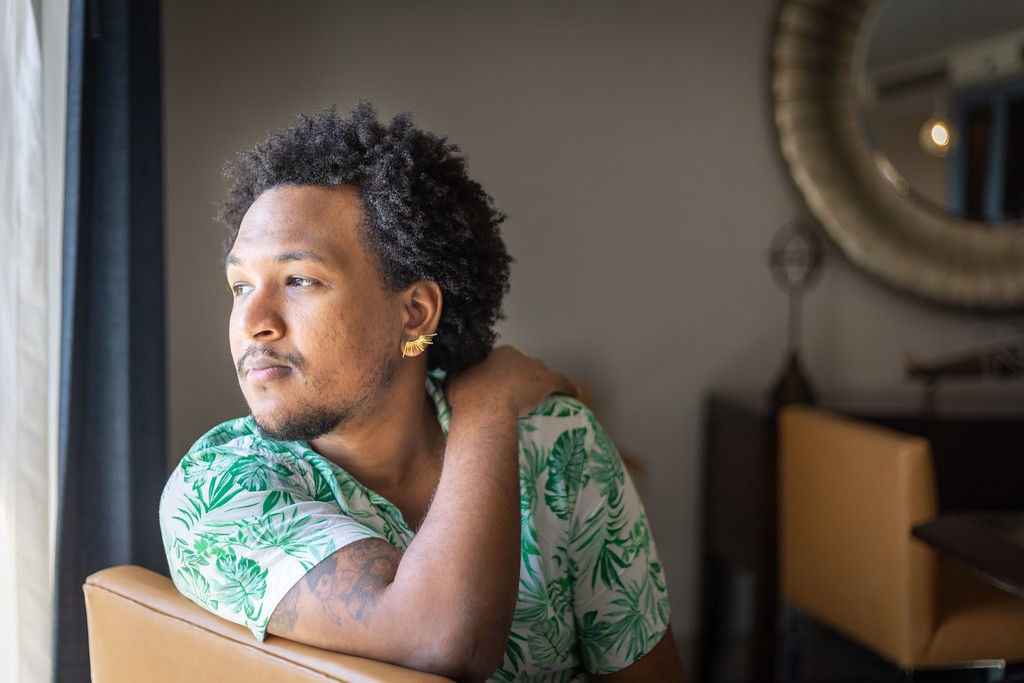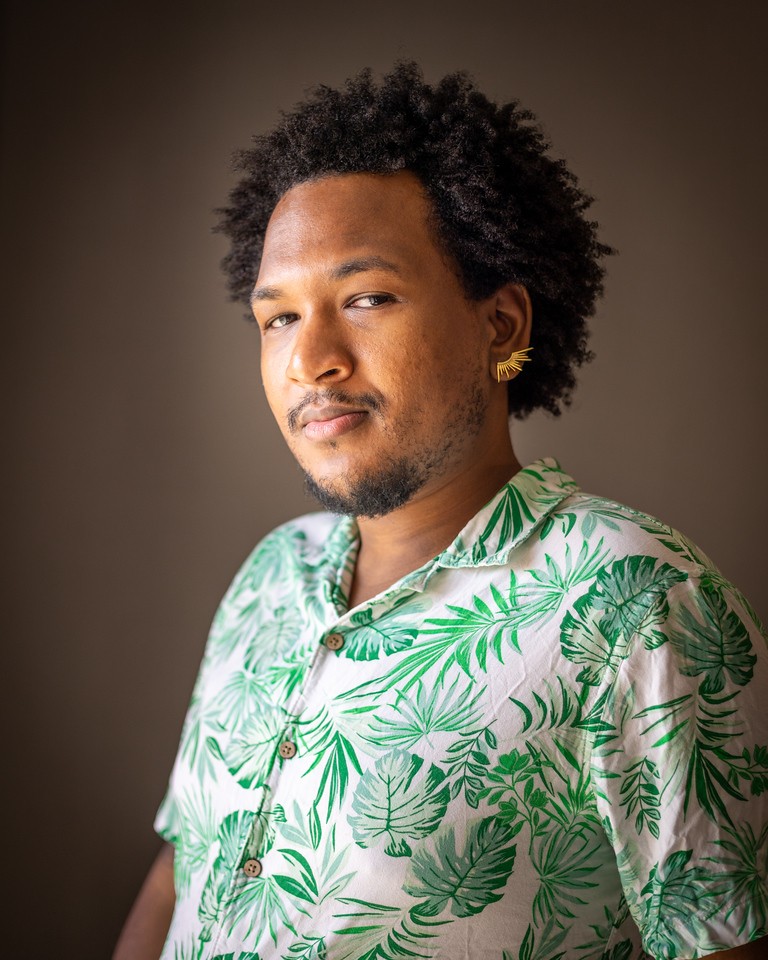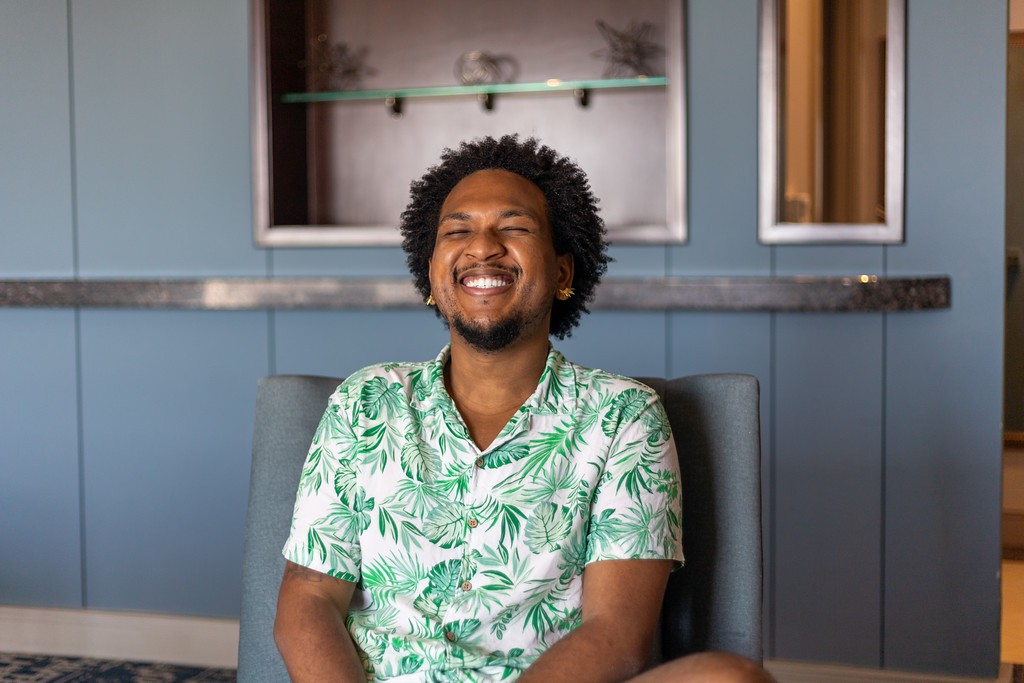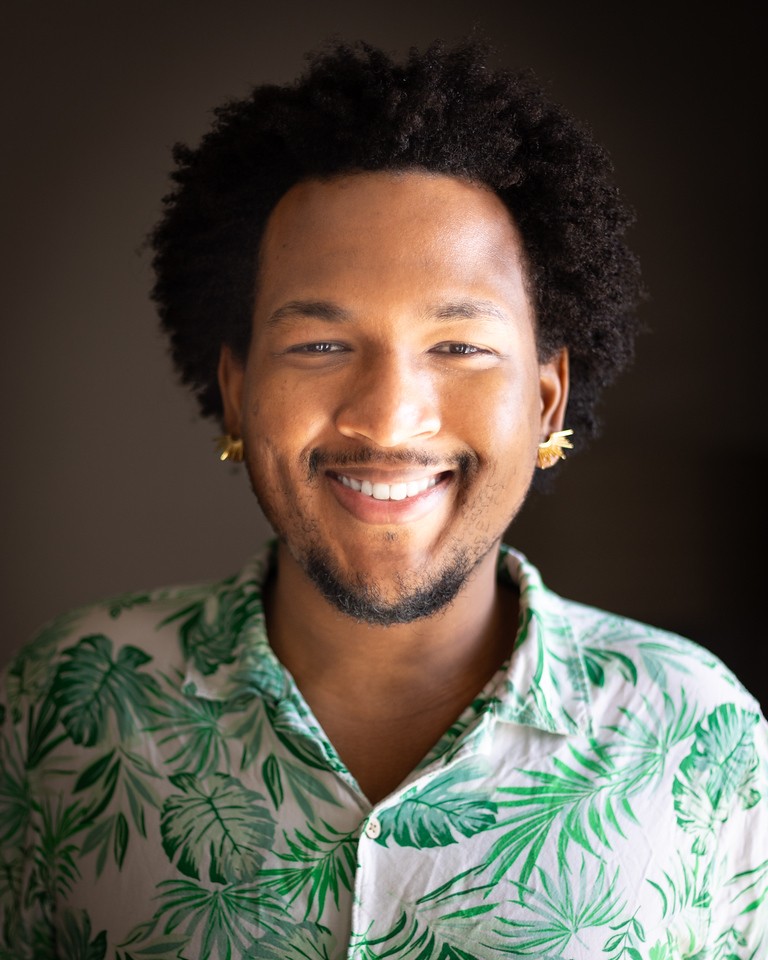We were lucky to catch up with André Santana recently and have shared our conversation below.
André, so good to have you with us today. We’ve always been impressed with folks who have a very clear sense of purpose and so maybe we can jump right in and talk about how you found your purpose?
I’ve spent a lot of time thinking about what’s important to me. I went to a college where I got to ask a lot of questions, make a lot of mistakes, and basically try everything. I thought I wanted to study architecture, or ceramics, or computer science, and even though I was interested in those things, it was really psychology that struck me and said, “Here’s something that gives you a lens to look at the world.”
So I dove headfirst into my psychology degree and started dabbling in sociology and biology, which collectively became my second major. It was really when I got to my senior thesis that I said, “Okay, what can I add here?” I think the purpose popped up during that project because I picked a topic that was personal (queer identity development across these three disciplines) and tried my best to start asking the question “How do we become ourselves?”
This feels big, ambiguous, and sometimes a little pretentious, but it really just puts me in a position to say that I want the things I do and how I move through the world to positively affect people in the process of deciding who they’re going to be. I want to be an optimistic light on people’s journeys, a sort of lighthouse of advice. Or, in the case of my audiobook narration work, the voice that takes you through a transformative story that might help you see you’re not alone in the world or in your struggles.
Let’s take a small detour – maybe you can share a bit about yourself before we dive back into some of the other questions we had for you?
Broadly, I’m a voice actor specializing in audiobooks. I’ve been narrating for almost three years with a few dozen titles under my belt and some work across video games, dubbing, and other spaces. My motto is “on a journey to tell great stories” because I really am on the hunt for books that change me on a molecular level. I love heartbreak, I love being pushed as an actor, and as someone with a writing background, I love narrating absolutely delectable prose. I adore this work and I’m so glad I found it this early in my adult life.
At the time of this interview, I’ve completed over 70 titles across middle-grade fantasy, adult romance, family drama, knowledge management, personal essay collections, queer horror, sentient house literature, and ominous AI science fiction, to name a few. I feel so fortunate to be in a space not just to be creating art, but really to be in collaboration with every author I narrate for.
I truly fall in love with every book, and have a connection with just about every title I’ve narrated. Some of the titles I’ve been most anticipating this late summer/early fall season include: CALL THE DARK by J. Todd Scott, THE BORDEN MURDERS, by Sarah Miller, THE CHRISTMAS ORPHANS CLUB by Becca Freeman, STARS IN YOUR EYES by Kacen Callender, and FAMILY MEAL by Bryan Washington. I’ve got a place in my heart for just about every book I’ve narrated, and I hope folks catch that when they listen!
If you had to pick three qualities that are most important to develop, which three would you say matter most?
When I was growing up, I moved across city boundaries in elementary school into a neighborhood with different standards for math, and when I moved back to the original neighborhood two years later for middle school, I got bumped up a year in math without any consultation. This really stunted me. I didn’t know what I had missed and constantly fell behind. Then, I ultimately dropped out of high school to pursue a surprisingly challenging undergraduate degree that launched me into even more academic challenges. All of this is to say that I’ve spent most of my adult life getting specific about the skills and qualities that help keep me afloat and at pace in a world where I’ve regularly felt insufficient.
The three skills and qualities I’d pick are empathy, organization, and the ability to turn a vision into a plan.
I think empathy is a skill. We have to work it, to spend time learning about other people, to dig deep into how people can look at the world in ways that are so different from us. We might not always agree, and sometimes to be truly empathetic it’s actually important to disagree with some views of the world. But I think that empathy has been important for me in building personal and professional relationships. I’ve connected with people in real ways wherever I am and try to create a positive atmosphere in the short moments I might step into a stranger’s life. Empathy is helpful for me as an audiobook narrator, too—especially when it comes to villains—but it’s most helpful for me as someone in a politicized world, and as someone in a politicized body. I have empathy for myself when other people won’t offer it to me. I’ve had to develop empathy for myself as I turned a life-long narrative about how I was “lazy” into a journey through ADHD and a variety of mental health experiences. With honesty about the world around me, empathy has kept me afloat.
Having mentioned my ADHD, I can’t understate the importance of organization. I went into college without any systems for studying, scheduling my day, or keeping track of the ever-growing pile of documents that always floated around me. In college, I started to realize that I loved creating organizational systems. Finding out the best folder organizing process, starting to use a calendar to keep track of things, and then moving into actively scheduling things that just seemed to happen for other people: homework time, relaxation time, and chores time. More important than using one perfect system, my systems have evolved. I still make mistakes, and sometimes balls drop. But I feel increasingly more grounded with an organized calendar, with programs like Notion to track my work, and just leaning into what I know works best for me which is strictly scheduling everything and taking advantage of external sources of accountability.
Finally, turning a vision into a plan. Years ago, I was a dreamer. I have a great ability to look at a system, see what’s wrong, and make a plan. But the execution wasn’t always there. The minutia and the daunting nature of long tasks pushed me away. But in some ways, that’s the most important part. A mediocre plan executed is better than a perfect plan left on the drawing table. That’s the skill I think I’ve come the farthest with, just doing the work. In combination with empathy and organization, it gets easier every day.
What’s been one of your main areas of growth this year?
As an audiobook narrator, when I started I had an idea of what I was “supposed” to sound like. People will hear me talk all the time about how I wanted to narrate just like Emily Woo Zeller or Natalie Naudus. What I realized over time was that they both had found their unique voices, and that made their performances more honest and more powerful.
I started to drill this into my head back in 2021 when I took Acting for Audio with Joel Froomkin, but this year in particular I have found myself finishing more and more projects feeling like I’ve just done my best work yet. I’m really blessed to be narrating back-to-back titles that are fantastically written and filled with emotional depth. And when I sit down and ask myself to be honest with the text, I feel like I hear the writing aloud as I’m narrating. The more I work, the more I coach, and the more deeply I prepare the books, the more clearly that voice in my head is telling me where this book wants to be ushered.
I’m grateful to be working in a space where every week I’m telling a new story because it gives me constant opportunities to grow. I can’t wait to see where I land in another year!
Contact Info:
- Website: www.andreonthemic.com
- Instagram: https://www.instagram.com/andreonthemic/
- Linkedin: https://www.linkedin.com/in/santana-a/
- Twitter: https://twitter.com/Andreonthemic
- Other: https://www.tiktok.com/@andre.onthemic




Image Credits
Eileen Descallar Ringwald




